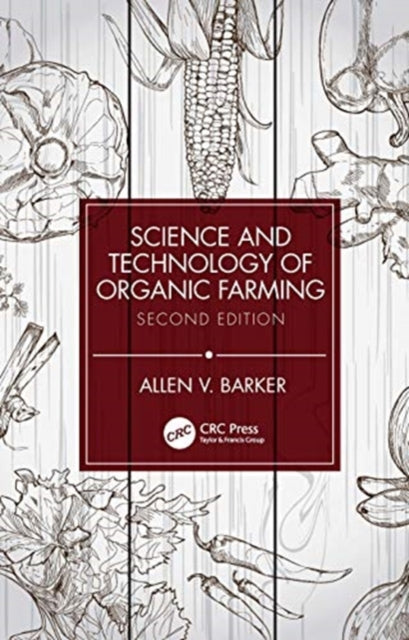Allen V.Barker
Science and Technology of Organic Farming
Science and Technology of Organic Farming
YOU SAVE £4.32
- Condition: Brand new
- UK Delivery times: Usually arrives within 2 - 3 working days
- UK Shipping: Fee starts at £2.39. Subject to product weight & dimension
Bulk ordering. Want 15 or more copies? Get a personalised quote and bigger discounts. Learn more about bulk orders.
Couldn't load pickup availability
- More about Science and Technology of Organic Farming
Organic farming is a well-researched science that uses plant nutrition and protection to achieve adequate yields. The second edition of The Science and Technology of Organic Farming provides practical information on maintaining soil fertility, using green manures, composts, and lime, controlling weeds, insects, and diseases, and storing food produce without refrigeration. It also includes an entirely new chapter on hydroponics.
Format: Hardback
Length: 256 pages
Publication date: 06 April 2021
Publisher: Taylor & Francis Ltd
Organic farming is a multifaceted approach that goes beyond a mere philosophy. It is a well-researched science rooted in the principles of sustainability and environmental stewardship. In the second edition of "The Science and Technology of Organic Farming," readers are presented with a comprehensive exploration of the scientific basis of organic farming and the practical methods required to achieve optimal yields through plant nutrition and protection.
Organic farming is a scientifically derived method of improving soil fertility, aiming to increase agricultural yields while minimizing the use of chemical inputs. This approach recognizes the importance of maintaining soil health and biodiversity, which are crucial for sustaining agricultural productivity in the long term. By nurturing the soil with organic matter, implementing natural pest control techniques, and promoting plant growth through balanced nutrition, organic farmers can achieve sustainable and environmentally friendly agricultural practices.
One of the key aspects of organic farming is the understanding of soil fertility and plant nutrition. The book delves into the chemistry of the plant, the soil, and the soil solution, providing a comprehensive overview of the essential macronutrients and micronutrients required for plant growth. Chapters on soil fertility and plant nutrition explain the importance of plant macronutrients such as nitrogen, phosphorus, and potassium, as well as micronutrients such as iron, calcium, and magnesium. The text also outlines the role of organic matter in maintaining soil fertility, the benefits of using green manures, composts, and lime, and the various methods of tillage and land management employed in organic agriculture.
In addition to soil fertility and plant nutrition, the book offers practical guidance on various aspects of organic farming. Chapters on organic methods of controlling weeds, insects, and diseases provide insights into natural pest management techniques, such as crop rotation, companion planting, and the use of beneficial insects. The text also discusses organic approaches to storing food produce without the need for refrigeration, emphasizing the importance of proper storage practices to maintain the quality and freshness of organic produce.
Furthermore, the second edition of "The Science and Technology of Organic Farming" includes an entirely new chapter on hydroponics, which provides an organic approach to hydroponic crop production. Hydroponics is a method of growing plants in a controlled environment using nutrient solutions, and it has gained popularity in recent years due to its efficiency and sustainability. The chapter explains the principles of hydroponics, the types of systems available, and the techniques used to grow crops in organic hydroponic systems.
This edition of the book is a valuable resource for anyone interested in organic farming. It is designed to be accessible to farmers, agricultural advisers, and students alike. The comprehensive bibliography of references provides a wealth of information for further exploration, allowing readers to delve deeper into the specific topics covered in the text.
In conclusion, organic farming is a scientifically derived method of improving soil fertility and increasing agricultural yields while minimizing the use of chemical inputs. It is a philosophy that recognizes the interconnectedness of soil, plants, and the environment, and it offers a sustainable and environmentally friendly approach to agriculture. The second edition of "The Science and Technology of Organic Farming" provides a comprehensive exploration of the scientific basis.
Weight: 560g
Dimension: 242 x 160 x 23 (mm)
ISBN-13: 9780367548674
Edition number: 2 New edition
This item can be found in:
UK and International shipping information
UK and International shipping information
UK Delivery and returns information:
- Delivery within 2 - 3 days when ordering in the UK.
- Shipping fee for UK customers from £2.39. Fully tracked shipping service available.
- Returns policy: Return within 30 days of receipt for full refund.
International deliveries:
Shulph Ink now ships to Australia, Belgium, Canada, France, Germany, Ireland, Italy, India, Luxembourg Saudi Arabia, Singapore, Spain, Netherlands, New Zealand, United Arab Emirates, United States of America.
- Delivery times: within 5 - 10 days for international orders.
- Shipping fee: charges vary for overseas orders. Only tracked services are available for most international orders. Some countries have untracked shipping options.
- Customs charges: If ordering to addresses outside the United Kingdom, you may or may not incur additional customs and duties fees during local delivery.


